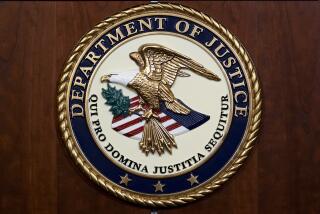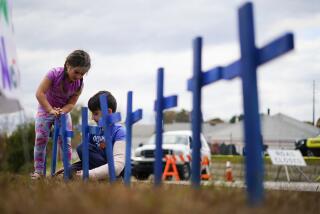Police OKd Unregistered Pistol, Rowan Testifies
- Share via
WASHINGTON — Columnist Carl T. Rowan testified Tuesday that police officials had told his son there would be no problem if the elder Rowan handled the weapon he later used against an intruder in his backyard.
Rowan, an outspoken opponent of firearms ownership, is charged with use of an unregistered handgun in the June 14 shooting of Benjamin Smith, 18, of Chevy Chase, Md. If convicted of the misdemeanor charges, the 63-year-old syndicated writer could get two years in prison and a $2,000 fine.
The defense rested its case Tuesday, the second day of the trial, after Rowan and his son, Carl Jr., testified. The prosecution rested earlier in the day, after calling three witnesses. Closing arguments and jury instruction were scheduled for today.
Threats From the Klan
In 1982, Rowan’s son, then an FBI agent, left the .22-caliber pistol at his father’s home after the columnist received death threats purportedly from the Ku Klux Klan, Rowan, who is black, told the District of Columbia Superior Court jury.
Police officials at that time told Rowan Jr. he had a “blanket exemption” from the district’s handgun-registration law because he was a federal agent, Rowan also told the court.
Earlier, Rowan’s son testified that twice in 1982, and once when he was preparing to leave the FBI in 1983, police told him he did not have to register weapons he had purchased for personal use.
Rowan Jr. testified he told the police that other members of his family might handle the weapon, but “they told me that as long as (the gun) was where it lawfully should be, if others have access to it, it isn’t a problem.”
Rowan’s attorneys argued that the columnist and his son got bad advice from members of the police gun-control unit about the registration policy, which stipulates that a weapon may lawfully be used only by its registered owner.
Home Defense Cited
A police official testified that Rowan broke the law by using an unregistered weapon, but said he should not have been prosecuted because he apparently acted in defense of his property.
Police Inspector James R. Lee, whom Rowan’s attorney called as an expert witness on gun registration matters, told the court Rowan was not authorized to handle the weapon he fired at the youth who came into his yard to swim in the pool.
Lee said he would have recommended that Rowan not be prosecuted, however, because a police investigation of the shooting found that the columnist had thought he was acting in self-defense.
Detective Charles J. Jones, who arrived at Rowan’s house after the shooting, told the court that a sliding glass door at the rear of the house bore signs that someone had tried to force it open, but he could not say when the door had been damaged.
More to Read
Sign up for Essential California
The most important California stories and recommendations in your inbox every morning.
You may occasionally receive promotional content from the Los Angeles Times.












